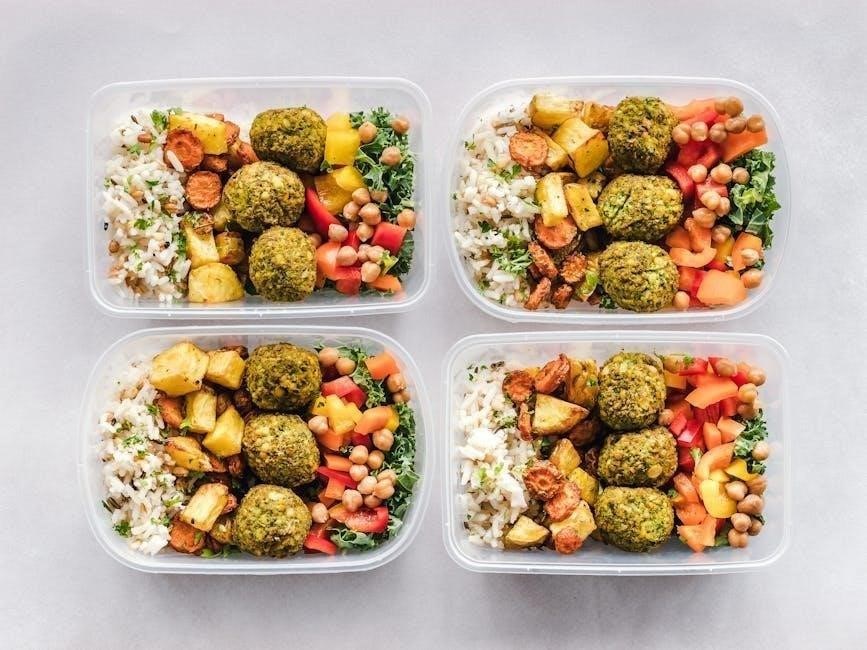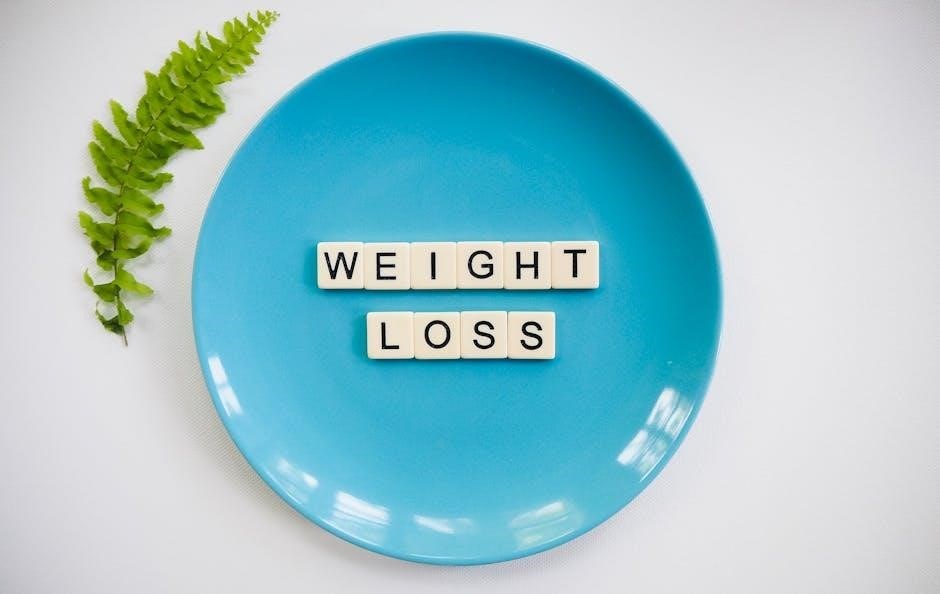8-week diet plan for runners pdf
Get your free 8-week diet plan for runners! Tailored nutrition to boost performance, aid recovery, and fuel your runs. Download the PDF now!
Welcome to this structured 8-week diet plan designed for runners seeking to enhance performance and support weight loss. Combining proper nutrition with training‚ this plan helps fuel your body for optimal results while maintaining a balanced and flexible approach to meals.
Understanding the Importance of Nutrition in Running
Nutrition plays a vital role in running performance and overall health; A well-balanced diet provides the energy‚ endurance‚ and recovery needed to optimize training and races. Carbohydrates are the primary fuel for runs‚ while proteins support muscle repair and growth. Hydration and electrolytes are crucial for maintaining performance and preventing fatigue. Proper nutrition also reduces the risk of injuries and enhances recovery. A runner’s diet should focus on whole‚ minimally processed foods‚ including lean meats‚ vegetables‚ whole grains‚ and healthy fats. Avoiding high-sugar and processed foods ensures sustained energy levels and supports long-term health. This 8-week plan emphasizes these principles to help runners achieve their goals effectively.
Setting Realistic Goals for Weight Loss and Performance
Setting realistic goals is essential for achieving success in both weight loss and running performance. Aim to lose 0.5 to 1 pound per week for a sustainable weight loss. For performance‚ focus on gradual improvements in speed‚ endurance‚ or distance. prioitize consistency in training and nutrition‚ as progress takes time. Celebrate small victories‚ like increasing weekly mileage or reducing run times. Track your progress through metrics like pace‚ energy levels‚ or how you feel during runs. Stay patient and avoid extreme restrictions‚ as they can hinder performance and overall health. By aligning your goals with the 8-week plan‚ you’ll create a foundation for long-term success in running and nutrition.

Key Nutritional Components for Runners
A runner’s diet should focus on carbohydrates for energy‚ proteins for muscle repair‚ and fats for endurance. These macronutrients work together to fuel performance and support recovery.

Macronutrient Balance: Carbohydrates‚ Proteins‚ and Fats
A well-balanced diet for runners focuses on three key macronutrients: carbohydrates‚ proteins‚ and fats. Carbohydrates are the primary energy source‚ with complex carbs like whole grains and vegetables being ideal for sustained fuel. Proteins are essential for muscle repair and recovery‚ particularly after intense runs‚ with runners requiring 50-75% more protein than non-runners. Healthy fats‚ such as those from nuts‚ avocados‚ and olive oil‚ support hormone production and provide long-lasting energy. Striking the right balance ensures optimal performance‚ prevents fatigue‚ and aids in recovery. A typical ratio might include 55-65% carbs‚ 20-25% protein‚ and 15-20% fats‚ tailored to individual needs and training intensity.
Hydration and Electrolyte Management
Proper hydration and electrolyte balance are critical for runners to maintain performance and overall health. Aim to drink 6-8 ounces of water every hour‚ adjusting for intensity and weather conditions. Electrolytes like sodium and potassium are essential for preventing cramps and maintaining fluid balance. Runners should prioritize hydration before‚ during‚ and after runs‚ especially for sessions lasting over an hour. Incorporating electrolyte-rich drinks or tablets can help replenish lost salts. Additionally‚ monitor urine color to ensure it’s pale yellow‚ indicating adequate hydration. Avoid overhydration and listen to your body’s needs to strike the right balance for optimal performance and recovery.
Pre-Run and Post-Run Nutrition Strategies
Optimizing pre-run and post-run nutrition is essential for performance and recovery. Pre-run meals should focus on complex carbohydrates and lean proteins‚ consumed 2-3 hours before running to avoid digestive discomfort. Examples include oatmeal with nuts or whole-grain toast with avocado. Stay hydrated by drinking water or electrolyte-rich beverages‚ especially in hot conditions. Post-run‚ prioritize recovery within 30 minutes with a mix of carbohydrates and protein to replenish energy stores and repair muscles. Smoothies‚ yogurt with fruit‚ or a recovery shake are ideal options. Avoid heavy‚ greasy foods immediately after running and opt for nutrient-dense choices to support recovery and prepare for the next session.

Weekly Meal Plan Structure
This structured plan offers balanced meals‚ snacks‚ and hydration strategies‚ ensuring runners meet their energy needs. It emphasizes complex carbs‚ lean proteins‚ and healthy fats.
Breakfast Options: Complex Carbs and Lean Proteins
Starting your day with a nutrient-dense breakfast is crucial for runners. Complex carbs provide sustained energy‚ while lean proteins support muscle repair and recovery. Oatmeal with fresh berries and a sprinkle of nuts is an excellent choice‚ offering a mix of complex carbohydrates and healthy fats. Eggs are another great option‚ providing high-quality protein and essential amino acids. Greek yogurt with whole grain granola and sliced bananas also makes for a balanced breakfast‚ combining protein‚ fiber‚ and natural sugars. These options ensure you’re fueled for your morning runs and set a healthy tone for the rest of the day.

Lunch and Dinner Ideas: Balanced and Nutrient-Dense Meals
For runners‚ lunch and dinner should be balanced with complex carbs‚ lean proteins‚ and healthy fats to sustain energy levels and support recovery. Grilled chicken or turkey with quinoa‚ roasted vegetables‚ and a drizzle of olive oil makes for a satisfying meal. Salmon paired with brown rice and steamed greens is another excellent option‚ providing omega-3 fatty acids for inflammation reduction. Lentil soup with whole grain bread or a hearty veggie stir-fry with tofu are plant-based alternatives that offer a mix of protein and fiber. These meals ensure you’re well-fueled for training while maintaining a nutrient-dense diet that promotes overall health and performance.
Snacking: Healthy Choices for Energy and Recovery
Snacking plays a crucial role in maintaining energy levels and aiding recovery for runners. Opt for nutrient-dense options like bananas‚ which provide quick energy‚ or a handful of almonds for healthy fats and protein. Greek yogurt with berries is another excellent choice‚ offering a mix of protein and antioxidants to support muscle repair. Energy bars with whole grains and minimal sugar can be convenient‚ but aim for homemade or natural options. Fresh fruits‚ such as apples or oranges‚ are also great for a natural energy boost. Pair snacks with water or a sports drink to stay hydrated and replenish electrolytes‚ especially after intense workouts. These choices ensure sustained energy and support your training goals effectively.

Special Considerations for Runners
Hydration and electrolyte balance are critical for performance. Runners require increased protein intake and should avoid processed foods and high-sugar options to optimize recovery and energy levels.
Meal Timing and Frequency
Proper meal timing and frequency are essential for runners to maintain energy levels and support recovery. Aim for three main meals and two to three snacks daily‚ spaced evenly throughout the day. Eat a balanced meal or snack 1-3 hours before running‚ focusing on complex carbs and lean proteins. Post-run‚ refuel within 30-60 minutes with a mix of carbohydrates and protein to aid recovery. Stay hydrated by drinking small‚ regular amounts of water‚ especially on hot days. Avoid heavy meals close to run times and opt for light‚ easily digestible snacks instead. Consistency in meal timing helps optimize performance and prevents energy crashes during training.
Recovery Nutrition and Muscle Repair
Recovery nutrition is vital for muscle repair and adaptation after running. Within 30-60 minutes post-run‚ consume a mix of carbohydrates and protein to replenish glycogen stores and repair muscle tissue. Lean proteins like chicken‚ fish‚ and legumes‚ along with complex carbs from whole grains‚ are ideal. Incorporate anti-inflammatory foods such as tart cherry juice and beets to reduce muscle soreness. Stay hydrated with water and electrolytes to support recovery. Aim for balanced meals rich in omega-3 fatty acids‚ vitamins‚ and minerals to promote healing. Adequate sleep and consistent nutrition will enhance your body’s ability to recover and perform optimally in subsequent training sessions.

Avoiding Processed Foods and High-Sugar Options
Avoiding processed foods and high-sugar options is crucial for optimal performance and weight management. These foods often provide empty calories‚ leading to energy crashes and hindering recovery. Instead‚ focus on whole‚ unprocessed foods like lean meats‚ vegetables‚ whole grains‚ nuts‚ and legumes‚ which offer sustained energy and essential nutrients. Reducing sugar intake helps maintain stable blood sugar levels and prevents unnecessary calorie consumption. Choose natural sources of sugar‚ such as fruits‚ over processed snacks. By prioritizing high-quality‚ minimally processed foods‚ you’ll fuel your body effectively‚ support your training‚ and achieve your goals without compromising on nutrition or performance.
Completing the 8-week diet plan for runners is a significant milestone‚ but the journey doesn’t end here. This plan has provided a foundation for improving performance‚ supporting weight loss‚ and fostering healthier eating habits. Consistency is key‚ so continue prioritizing balanced nutrition and gradual progress. As you move forward‚ consider incorporating new recipes and refining your meal timing to suit your training schedule. For further improvement‚ explore advanced nutrition strategies or consult a sports dietitian for personalized advice. Remember‚ nutrition is a long-term investment in your health and running career. Stay committed‚ and celebrate the progress you’ve made while looking forward to future goals.

